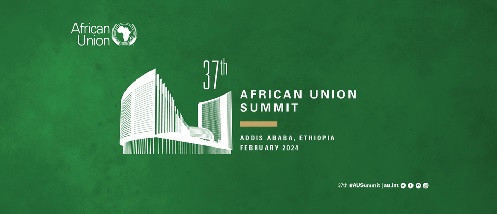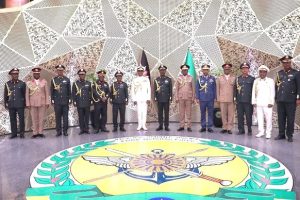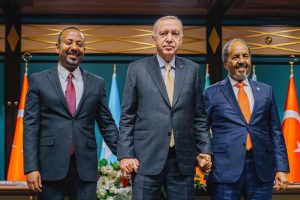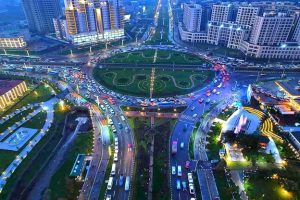
It is known that Ethiopia is capable of organizing, hosting and carrying out successfully conferences the likes of which is the AU Summit. Ever since the founding conference of the Organization of African Unity, OAU, in 1963, Ethiopia has a long tradition of preparing and holding successfully these events multiple times impeccably. The same is the one that just ended last Sunday and the Government Communication Service has testified to that with its statement thanking all those who contributed for the shining success of the event.
According to the Government Communication Service the 37th African Union heads of state and government conference and the 44th ministerial meeting have both ended peacefully and successfully. It said the five day events took place in an atmosphere of peace and tranquility and without any threats or incidents or issues of lack of security. All the organizers of course deserve praise and gratitude for such success, it said. Moreover, even the residents of Addis Ababa as well deserve praise for their cooperation in leaving the roads that were reserved for the delegates to travel to and from the conference halls without the usual hustle of the traffic congestion that is characteristic of any metropolis.
This year’s AU summit in Addis Ababa has been special because the delegates had the opportunity to go and visit the newly inaugurated Adwa Victory Memorial right in the heart of the city. In doing so they all expressed their admiration for the museum that showed the historical significance of the Adwa Victory as the beginning of the Pan African Movement. Visiting the Adwa Victory Memorial they all expressed their gratitude for the Ethiopian people and government for constructing such a living memorial for the sacrifice paid for the independence of the country and also for igniting the fire of resistance to colonialism throughout the entire world. They all admired the patriotism of Ethiopians in the defense of their country against aggression by alien colonialists.
The museum gave them the opportunity to look closely for what exactly happened in the 1890s in Ethiopia and how it became the cornerstone of modern Ethiopia. And not only that, but also the beginning of the Pan African movement, an inspiration for all peoples of African heritage has been given due space. Interviewed by the media the visitors said they were impressed by what they saw at the Adwa Victory Memorial and how it changed the perception they had about this important historic episode in the life of an African state. As Africans they said they were proud to share such a heritage and the fact that the inauguration of the memorial coincided with the 37th AU Summit was worthy of extra appreciation.
This year’s AU summit attendants also had the opportunity to see all the beautiful parks of the city, largely the results of the country’s Green Legacy Initiative characterized by the planting of millions of tree seedlings in and around the capital besides the entire country. Ethiopia as almost every African country has been deeply affected negatively by the consequences of climate change and one manner of combating it is covering the land with greenery and expands agriculture. It is known that the campaign launched by Prime Minister Abiy Ahmed a few years ago has resulted in the planting of more than thirty billion seedlings and similar events have been encouraged to take place in other African countries with Ethiopia sharing its experience and expertise with them.
The Summit itself presented the golden opportunity for the Ethiopian Ministry of Foreign Affairs officials including the ministers and above all the prime minister himself to engage with multiple leaders and statesmen of Africa and even beyond on bilateral and multilateral issues of mutual interest and concern.
At the same event the Minister of Foreign Affairs Ambassador Taye Atske Selassie has presented to the foreign ministers conference the proposal of including Ethiopia’s official federal language Amharic to be an official working language of the AU Commission along with the English, French and Arabic languages. The minister underlined that Amharic was one of the languages used to draft the Organization of African Unity’s Founding Charter and making Amharic one of the official working languages of the AUC, an African language would help promote faith in local culture and value African heritage by diversifying the languages of the AUC. Africa needs to nurture and appreciate its cultural traits and heritages and not dismiss it in favor of predominant alien influences. The African Union Commission can have a fundamental and key role in this endeavor.
This would contribute to further enrich African culture. Given the contribution Ethiopia has given to the foundation of the OAU now AU and the multiple peace making and peace keeping missions not only in Africa but also across the world, given the long history of Ethiopia as an independent state and be the vanguard in the fight against all forms of aggression by alien forces engaging in attacking Africans, the language of Ethiopia would deserve to be a means of communication at an official level at the African Union Commission.
The foreign minister has stated that Africa should exert every effort to preserve and value its cultural and linguistic heritages and one of the means is language. Other African languages must be encouraged to expand and be spoken by millions more than in their original place where they are used. Amharic is already an academic subject included in the curricula of various higher learning institutions in Europe and Asia and doctoral studies and researches are being carried out on it. Notably now China is among those countries giving lessons of Amharic in its universities.
At the sidelines of the summit Ethiopian authorities have had many separate meetings with many countries’ leaders and discussed matters that were a priority for the respective countries. The fact that many leaders of international organizations attended the summit has given the opportunity for Ethiopian leaders to meet them and discuss matters of common concern. Among the non- African leaders of the world in attendance at the summit was the Brazilian President Lula Ignacio da Silva who was also on a two-day official visit to Ethiopia. He visited the Adwa Victory Memorial and laid a wreath at the monument. He also held fruitful discussions with Ethiopian authorities including Prime Minister Abiy Ahmed.
Brazil as a member of BRICS group has special significance for Ethiopia to discuss how Ethiopia’s access to the group can help further strengthen economic relations. Ethiopia has had the opportunity to show how committed it is to expand education and make it accessible to all. It showed to visitors some of the organizations and schools in their activities of running feeding centers so that no child is left behind and remains without proper education because of economic hardship resulting in lack of educational materials, uniforms and other necessities beside being well fed. It showed how more than six million students benefit from free meals in the schools daily and how this has encouraged even the most skeptical families in the rural areas to send their children to school.
It is known that this year’s AU’s activities are focused on education particularly on the kind or quality of education that is up to the current advanced technological standard. African students must be given the kind of education that are up to the current levels of technological advancement so that they could be in a position to lead the present generation and compete in the world with equal chance as the others and prevailing. Africans should not be left behind in the world landscape of education and that is why the AU has dedicated the year as one that must focus on digital education that will help African youths to go side by side with their other continents’ peers. The summit has given the necessary emphasis on this point. Ethiopia has had the opportunity to disclose its progress in the field and many were impressed by Ethiopia’s efforts to expand education for all.
Taking advantage of the summit Ethiopia has also organized two other conferences side by side to the AU Summit. A discussion under the theme “Expansion of Digitalization for Africa Transformation” took place in the Pan-African Hall in the Adwa Victory Memorial Museum. President Sahle-Work Zewde on the occasion highlighted that technology has an irreplaceable role in harnessing Africa’s potential. She noted speeding up digitalization is convenient for dealing with pressures and providing quick solutions for problems. The expansion of digitalization will play a significant role in creating the prosperous Africa we want in 2063 she added.
The president recalled that the continental digital transformation roadmap 2023-2030 has been under implementation and that Ethiopia has designed a digital 2025 strategy that is in line with the continent’s conviction. Accordingly, the country has been carrying out extensive activities on the expansion of telecom infrastructure, internet access, and artificial intelligence.
The other supplementary event carried out on the sidelines of the summit was the one on food self-reliance in Africa in which president Sahle-Work took part. The event was entitled “Africa Can Be Food Self-Reliant: Climate- Smart Solutions and Collective Action for Food System Transformation.”
President Sahle-Work Zewde said on the occasion that the time for cooperation to ensure Africa’s food self-reliance is now. She also said that the current Adwa is to make Africa self-sufficient in food through a coordinated continental effort. She mentioned that 90 percent of Africa’s agriculture depends on rain and that agriculture does not have a modern system and pointed out that there is no coordination to ensure food security for the continent. The president mentioned that climate change is affecting the continent’s agriculture, adding that the limited availability of finance and other problems are challenging the process of ensuring food security. The president stressed that leaders and professionals should realize that the time for cooperation is now to ensure the continent’s food security. BY FITSUM GETACHEW
BY FITSUM GETACHEW
THE ETHIOPIAN HERALD THURSDAY 22 FEBRUARY 2024





